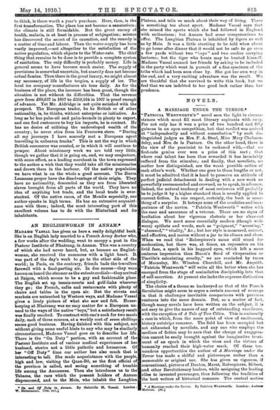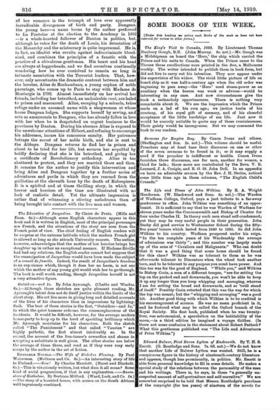NOVELS.
A MARRIAGE UNDER THE TERROR.*
"PATRICIA. WENTWORTH'S novel sees the light in circum- stances which must fill most literary aspirants with envy. For not only has it won a prize of two hundred and fifty guineas in an open competition, but that verdict was arrived at "independently and without consultation" by such dis- tinguished judges as Mrs. F. A. Steel, Miss Mary Chohnon- deley, and Mrs. de la Pasture. On the other hand, there is the view of the pessimist to be reckoned with,—that no first-rate genius ever won a prize of this sort ; that where real talent has been thus rewarded it has invariably suffered from the stimulus ; and finally, that novelists, no matter how distinguished, are the worst possible critics a each other's work. Whether one goes to these lengths or not, it must be admitted that it is hard to preserve an attitude of perfect judicial detachment in dealing with a new work so powerfully recommended and crowned, so to speak, in advance. Indeed, the natural tendency of most reviewers will probably be to judge it by a higher standard than is usually applied to current fiction. In one respect, certainly, the book is some- thing of a surprise. It betrays none of the crudities and inex- perience of the novice. "Patricia Wentworth " writes with the ease and assurance of a veteran. There are no signs of hesitation about her vigorous rhetoric or her clear-cut dialogue. We meet some essentially modern (though well- worn) epithets and words, such as "poignant," 'arresting," "obsessed," "vitality," Ise.; but her style is measured, correct-, and effective, and moves without a jar to its climax and close. When we read that "Robespierre's name still stood for moderation, but there was, at times, an expression on his livid face, a spark in his haggard eyes, which left a more ominous impression than Marat's flood of vituperation or Tinville's calculating cruelty," we are reminded by turns of Macaulay, Mr. Winston Churchill, and Mr. Asquith. "Patricia Wentworth" will write all the better when she has emerged from the stage of assimilative discipleship into that of self-assertion. At present she lacks the supreme distinction of simplicity.
The choice of a theme so hackneyed as that of the French Revolution might seem to argue a certain amount of courage in that it challenges inevitable comparisons with previous ventures into the same domain. But, as a matter of fact, though many novels have been written on the subject, it is not easy to give the names of any of outstanding excellence, with the exception of A Tale of Two Cities. This is eminently a case in which, from the mere point of view of excitement, history outstrips romance. The field has been occupied but not exhausted by novelists, and any one who employs the medium of fiction may be sure that the charge of exaggera- tion cannot be easily brought against the imaginative treat- ment of an epoch in which the vices and the virtues of humanity reached their high-water mark. Of these tre- mendous opportunities the author of A Marriage under the Terror has made a skilful and picturesque rather than a memorable or original use. She has given us vigorous, if conventional, pictures of Denton, Marat, Robespierre, Hebert, and other Revolutionary leaders, while assigning the leading roles to invented personages, thus following the tradition of the best writers of historical romance. The central motive
• A Marriage under the Terror. By Patricia Wentworth. London : Andrew Melrose. Ens.] of her romance is the triumph of love over apparently ineradicable divergences of birth and party. Dangeau, the young hero—a name borne by the author preferred to La Fontaine at the election to the Academy in 16S2 —is a whole-hearted follower of Danton in politics, but, although he votes for the death of Louis, his detestation of the Monarchy and the aristocracy is quite impersonal. He is, in fact, an idealist who revolts against indiscriminate blood- shed, and combines the principles of a fanatic with the practice of a chivalrous gentleman. His heart and his head are always at loggerheads, and we find ourselves continually wondering how he ever contrived to remain so long in intimate association with the Terrorist leaders. That, how- ever, only accentuates the dramatic contrast between him and the heroine, Aline de Rochambeau, a young orphan of noble parentage, who comes up to Paris to stay with Madame de Montargis in 1792. Almost immediately on her arrival her friends, including her betrothed, an undesirable roue, are baled to prison and massacred. Aline, escaping by a miracle, takes refuge under an assumed name with a shopwoman at whose house Dangeau lodges. She supports herself by sewing, and acts as amanuensis to Dangeau, who has already fallen in love with her when he is despatched on urgent business to the provinces by Danton. During his absence Aline is exposed to the unwelcome attentions of Hebert, and refusing to encourage his addresses, incurs his rancorous enmity. Her patroness betrays the secret of her noble birth, and she is sent to the Abbaye. Dangeau returns to find her in prison and about to be tried for her life, but secures her acquittal by boldly declaring that she is his betrothed, and giving her a certificate of Revolutionary orthodoxy. Aline is too shattered to protest, and they are married there and then. It remains for the author to justify this intervention and bring Aline and Dangeau together by a further series of adventures and perils in which they are rescued from the guillotine at the eleventh hour by the death of Robespierre. It is a spirited and at times thrilling story, in which the horror and heroism of the time are illustrated with no lack of realistic detail. Yet the ultimate impression is rather that of witnessing a stirring melodrama than of being brought into contact with the live men and women.







































 Previous page
Previous page